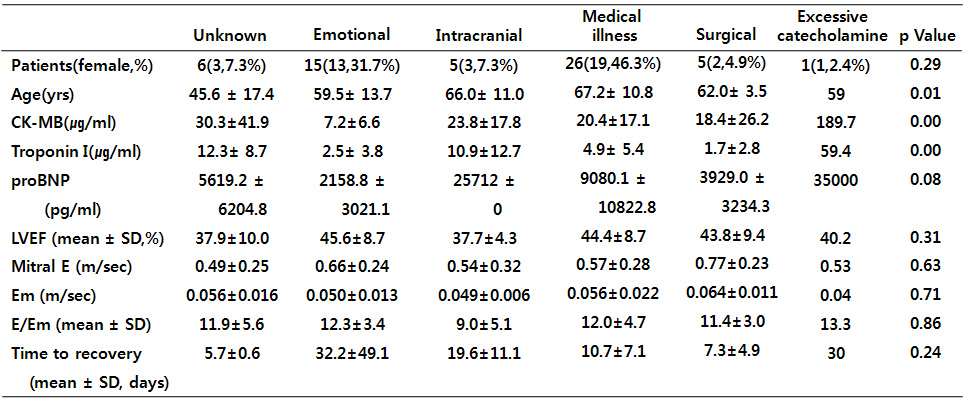| єя«•«ьљƒ : ±Єњђ
|
ЅҐЉцєш»£ - 530938 391 |
| Clinical Spectrum of Stress-Related Cardiomyopathy Syndrome in Korean population |
| лМАкµђк∞АнЖ®л¶≠лМАнХЩл≥СмЫР мИЬнЩШкЄ∞ лВік≥Љ¬є ,к≤љлґБлМАнХЩл≥СмЫР мИЬнЩШкЄ∞ лВік≥Љ¬≤ ,лПЩмХДлМАнХЩл≥СмЫР мИЬнЩШкЄ∞ лВік≥Љ¬≥ ,мШБлВ®лМАнХЩл≥СмЫР мИЬнЩШкЄ∞ лВік≥Љ4,л©Фл¶ђлЖАл≥СмЫР мИЬнЩШкЄ∞ лВік≥Љ5, к≥Дл™ЕлМАлПЩмВ∞л≥СмЫР мИЬнЩШкЄ∞ лВік≥Љ 6 |
| кєАмЖМмЧ∞¬є, кєАкЄ∞мЛЭ¬є ,мµЬмІАмЪ©¬є ,мЮ•мД±кµ≠¬є ,мЦСлПЩнЧМ¬≤ ,м±ДмД±м≤†¬≤ ,л∞ХнГЬнШЄ¬≥ ,нЩНкЈЄл£®вБі ,м°∞к≤љмЮД5 ,кєАнШХмД≠6 |
Background: Stress-related cardiomyopathy (SRCMP) can occur after acute mental or physical stress, intracranial events, acute medical illness and during pheochromocytoma crisis. Takotsubo cardiomyopathy is a variants of SRCMP with distinct morphological manifestations of apical ballooning. We studied the various clinical spectrum of SRCMP in Korean population. Methods: During a 6-year period (2004-2009), 58 patients were clinically diagnosed as stress-related cardiomyopathy. We analyzed 58 patients (mean age 62.3±13.3 yrs, female 70.7%) who fulfilled the following criteria: 1) regional wall motional abnormalities (WMA) in ventricle, 2) absence of obstructive coronary disease corresponding to region of WMA and 3) absence of known myocardiopathies. The precipitants of SRCMP was divided to 5 groups including emotional or physical stress, intracranial events, medical illness, surgical procedure related, and excessive catecholamines states. The morphological variants was grouped into apical and/or midventricular, isolated midventricular and/or basal, isolated basal, global and other localized WMA. Results: Most patients had medical illness(44.8%) or emotional stress(25.9%). The 49 patients (84.5%) had apical and/or midventricular WMA like takotsubo. 5 patients had isolated midventricular WMA. During mean 309.8 days follow-up, 2 patients had experienced recurrence of SRCMP. There were no significant difference in laboratory and echocardiographic parameters according to WMA groups. However, the patients with emotional stress had a significantly less elevated creatine kinase-MB (CK-MB) and troponin I(p=0.000, p=0.000). Other echcardiographic and clinical course had not significant difference according to the precipitant stress. Conclusions: In our study, SRCMP was occurred after various stress. Although the clinical courses were not different, the biomarker of cardiac injury (CK-MB,troponn I) was less elevated in patients with emotional stress.
|
|
|
Warning: getimagesize(/home/virtual/circulationadmin/renewal/econgress/conference/abstract/img_files/SRCMP090802.jpg) [function.getimagesize]: failed to open stream: No such file or directory in /home/virtual/circulationadmin/new/econgress/conference/manage/schedule/view_abstract.php on line 164

|
|





